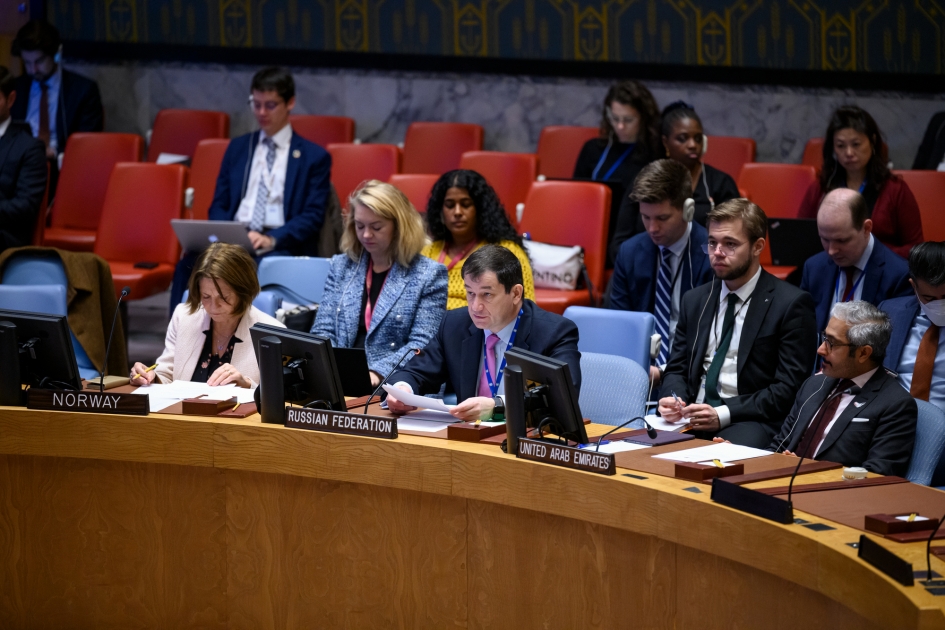Statement by First Deputy Permanent Representative Dmitry Polyanskiy at UNSC briefing on the situation in Libya
Mr.President,
We thank Special Representative of the Secretary-General and Head of the UN Support Mission in Libya (UNSMIL) Abdoulaye Bathily for the briefing on the current developments in Libya. Availing of this opportunity, let me again assure SRSG Bathily of our full support for his mediator efforts.
The situation in Libya remains very tense. Despite relative calmness on the ground, the current status quo is rather unstable. Clearly, duality of power is not going to end any time soon, which means no inclusive nation-wide elections or unification of Libyan state organs in the short term. Progress at the constitutional track remains rather modest. In the meantime, the situation risks spiraling out of control under the influence of divergent interests of external stakeholders. It explains why the Libyan file requires unfading attention of the Security Council, and this is exactly why we insisted on convening this meeting.
At this stage, the priority task is maintenance of the ceasefire and assistance to the Libyan political forces in their search for compromises. This appears especially relevant given the alarming reports that came in from Tripoli recently. We underscore that creating impediments for the work of state bodies is unacceptable. We call on the Libyan leaders to act in a reserved manner and keep from steps that are fraught with escalation. We reconfirm our approaches to cancellation of foreign military presence in Libya – we stand for a synchronized, well-balanced, systematic and step-by-step withdrawal of all non-Libyan armed groups and military units. This must be done in order to maintain the balance of powers and avoid escalation that may be triggered by a sudden “vacuum of security”.
The international community should provide coordinated assistance to the Libyans. In this process, UNSMIL is to act as one of major mediators. The key actors and Libya’s neighbors should not pursue any hidden agenda.
Mr.President,
One of the main reasons of the protracted Libyan crisis is the consistent policies of Western states, who claim committed to the Libyan political settlement, while at the same time they make use of the turbulent situation in the country in their own interests.
Among those interests, the energy factor takes by far not the last place. One does not need to be an expert to notice that some Western capitals pay increased attention to the issue of Libyan hydrocarbons, their extraction and transit. Libya is famous for its low net cost of oil production and high quality of oil. What’s more, the country is located not far from European energy markets.
It is no coincidence that every statement by Western officials on Libya somehow mentions the importance of unhindered access to Libyan natural resources, and the “force majeure” declared this summer at a number of Libyan oilfields caused a disproportionately negative reaction from these officials. This is not surprising at all. It was not yesterday that our Western colleagues set a goal to turn Libya into a “gas station” to meet their energy needs. They started moving towards this objective back in 2011, when NATO aggression ruined the Libyan statehood.
Mr.President,
It is obvious that the US Administration still considers the Libyan political process only through the lens of American economic interests, i.a. with a view to preventing the growth of prices for the “black gold”. Therefore, Washington’s main efforts seek not to ensure an in-depth resolution of the Libyan crisis, but rather are aimed at “preserving” the situation as it is, so no degradation can undermine deliveries of energy resources from Libya to the European market. Our US colleagues believe this is the main task of the Libyan authorities.
We cannot rule out that Washington may have made some behind-the-scenes arrangements with third countries regarding Libyan oil exports. Basically, Washington does not care who is going to produce the Libyan oil and on what legal grounds. The main thing is to challenge Russia at the global energy market. Actually, the US leadership has adopted a similar course with regard to other oil producing states of North Africa and the Middle East.
Mr.President,
It is true that the Libyan economy is dependent on the oil exports by more than 90 %. As reported by the Libyan National Oil Corporation, now oil production is standing at 1.2 million barrels per day. This will be further pushed forth to reach 2 million barrels daily. The largest oil deposits in Africa could make Libya enough money to ensure rapid recovery of the country. But amidst political instability, as well as the disunity of key Libyan financial institutions, oil proceeds not always make it to the Libyan budget, but may become stuck in foreign banks. It is critically important to make sure that these funds should be spent to the benefit of ordinary Libyans rather than end up in the pockets of a small number of entrepreneurs, including foreign businesses. However, this sort of scenario does not reconcile with Western priorities. Unfortunately, for these reasons, clandestine ploy, establishment of all sorts of non-transparent configurations, incitement of some politicians against the others, as well as attempts to impose someone else’s choices on the Libyan people still continue.
Thank you.
